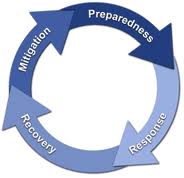
In just the past few months, our nation has faced a range of natural disasters that have forced local governments to take stock of their emergency preparedness and disaster response capabilities, including how they communicate with the public. In addition to natural disasters (and as the 10-year anniversary of September 11 reminded us), local governments also have taken on more responsibility to detect, prevent, and respond to terrorism acts.
During a telephonic press call that took place on Tuesday, September 20, 2011, in conjunction with the 97th ICMA Annual Conference in Milwaukee, a group of local government leaders (listed below) with direct experience responding to natural and man-made disasters highlighted the critical role that local governments must play in emergency management.
- Ron Carlee, ICMA chief operating officer, who, as former manager of Arlington County, Virginia, was at the helm of the county during 9/11
- William Fraser, city manager, Montpelier, Vermont, who discussed how this New England state capitol prepared for Hurricane Irene and the effects of that natural disaster on other jurisdictions in the region
- Aden Hogan, city manager, Evans, Colorado, and former assistant city manager of Oklahoma City, Oklahoma, during the 1995 terrorist attack
- Elizabeth Kellar, president and CEO, Center for State and Local Government Excellence and ICMA staff representative to the National Homeland Security Consortium
- Ken Pulskamp, city manager of Santa Clarita, California, and ICMA member representative to the National Homeland Security Consortium.
The panelists discussed a number of emergency-management-related issues from local, regional, and national perspectives. Download the audio recording of the call (MP3)
Big Picture
- Every emergency and disaster is local and local governments are now part of a response system that goes far beyond 911.
- Homeland security post-9/11 has evolved and training has broadened to include nontraditional partners, such as community policing.
- When major disasters strike, you never have enough resources.
- Urban Search and Rescue and other programs credential individuals in a range of emergency management skills (communications, water management, etc.).
Planning and Preparation
- Know that the first few hours after a disaster are the most important.
- Reduce everything to checklists.
- Have a plan, but be flexible; since it is going to change.
- Plan for what is probable. A good plan that activates resources is the best plan.
- Communities of all sizes have difficulty making time to plan for emergencies, but preparedness is essential
- Collaboration is critical. Practice response strategies with the partners you’re going to work with during a crisis, including mutual aid partners
Communicating with Citizens
- Onoing communication with citizens is critical.
- Twitter and other social media tools have the capacity to enhance resident communications.
- Best time to solicit citizen signups for community twitter feeds and other alert systems is during or just after an incident, when citizens most appreciate the value of such systems.
- Communities are using strategies such as reverse 911 to communicate with citizens
- A particular challenge for small communities is that they often don’t have a separate public information officer or individual responsible for social media. During the 2011 spring and summer floods in Vermont, for example, Montpelier city manager Bill Fraser reposted information from the city website to his personal website so that folks who hadn’t signed up for the city system could access the material on his site.
What to Say to Residents
- Be prepared to not count on local government for at least 72 hours. Know your neighbors, practice turning off water and gas lines, stockpile essential supplies, and purchase a generator, if needed.
- Pay attention to what is going on around you. Heed all local alerts and warnings.
- Gridlock is inevitable, particularly in metropolitan areas. Establish alternative routes to and from home, work, etc.
In recent issues of ICMA’s flagship PM magazine, several of the speakers on Tuesday’s call have explored challenges and best practices associated with local government emergency management. Read “Managing the Unthinkable” by Aden Hogan, or the September 2011 issue of PM magazine, featuring reflections and articles by Ron Carlee, Elizabeth Kellar, and a representative from the Community and Regional Resilience Institute (CARRI) in Oak Ridge, Tennessee.
For more information on the press call, contact Michele Frisby at 202-962-3658 or mfrisby@icma.org.
New, Reduced Membership Dues
A new, reduced dues rate is available for CAOs/ACAOs, along with additional discounts for those in smaller communities, has been implemented. Learn more and be sure to join or renew today!
